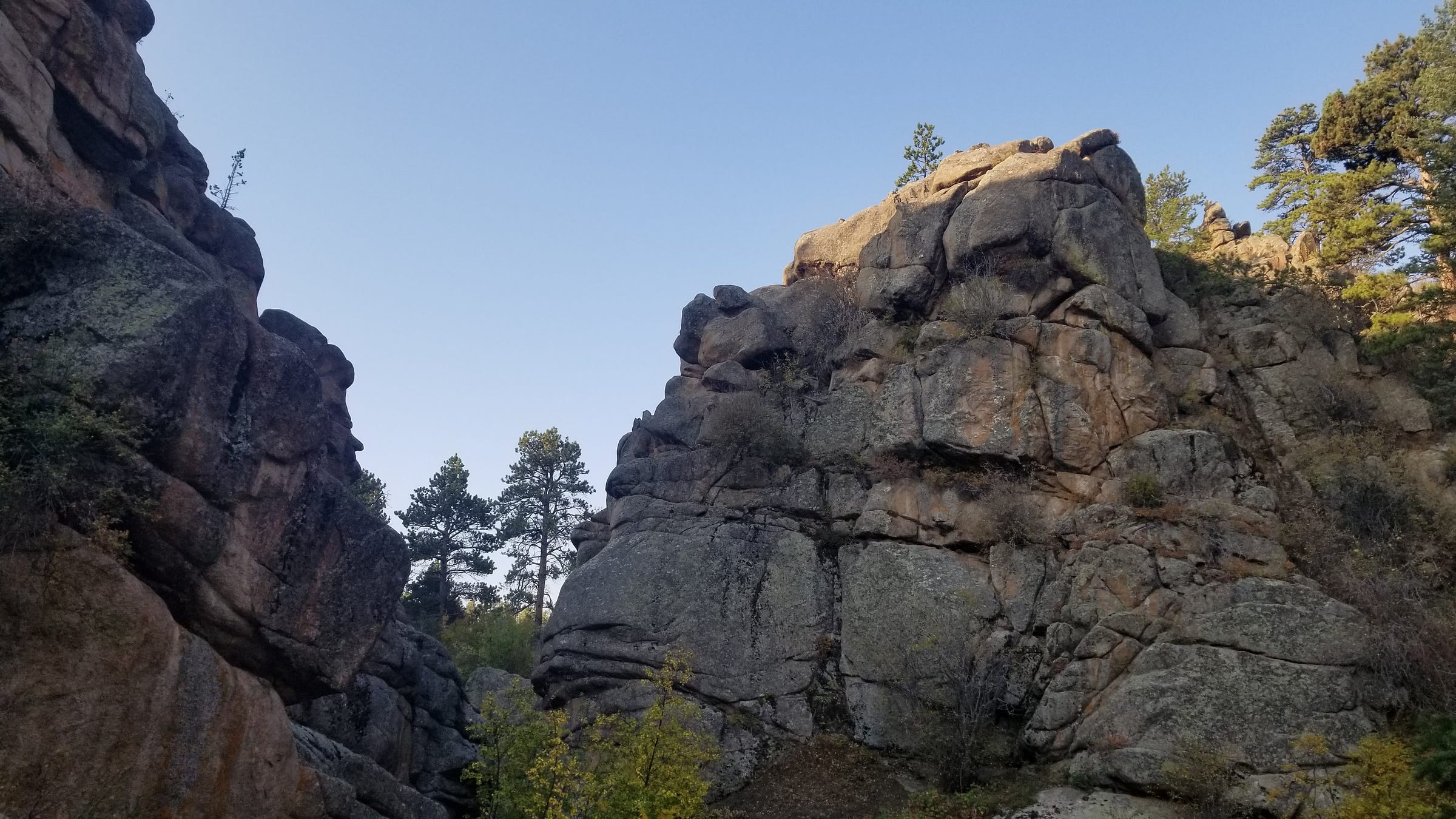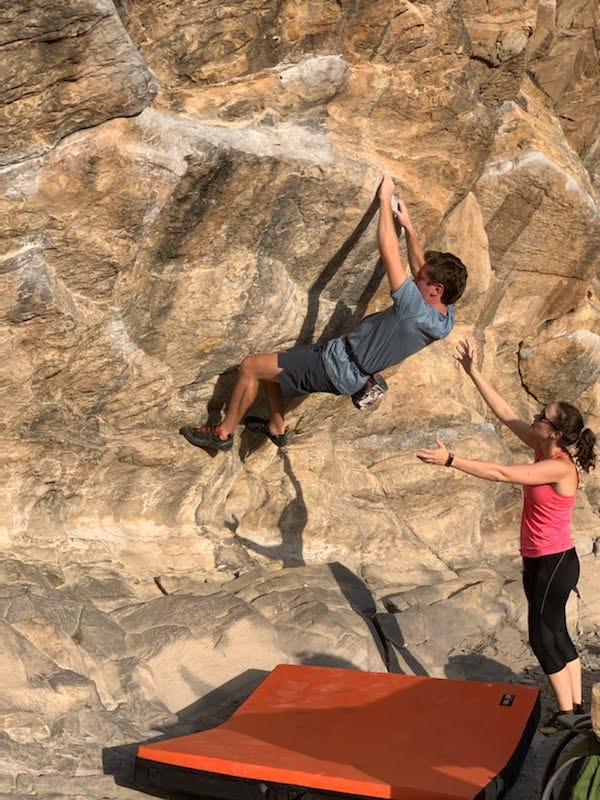Finding the Cure for Zombie Hobbies
You tell yourself you're having fun, but are you really? Here's what to do when you find yourself shuffling through the motions of the things you used to love:
The last glow of evening backlit the western ridge, while a dusty violet hue crept across the rest of the sky. Night would fall properly soon.
The five members of our little group all trained our head lamps on the rock before us. The formation was roughly the size of a compact SUV, just like the guidebook said.
One of my friends plunged her hands into her purple chalk bag, rubbing them together. “I think I can get it this time.” She approached the problem, and pressed her body against the base of the stout boulder. I stood beside her, waiting to break her fall with one of our crash pads.
She squatted low, before pushing off and flailing one of her arms upward. Her thumb and forefinger latched onto a chalk-stained chunk of rock.
“Nice job,” I said, shifting the pad a little.
She grunted, bumping her right hand up to the next hold. The problem only had one move left, but it was a doozy.
She repositioned her left hand so that the heel of her palm faced into the rock, and pushed upward. In the same motion, she threw her right leg up over the top of the rock.
“Beached whale beta!” She yelled. With all the grace the phrase implied, she wriggled her body over the ledge and onto the top of the problem. She clambered to her feet and raised her fists above her head in triumph. We all cheered.
After slipping and sliding our way back down the approach in the dark, we regrouped for drinks at the nearby rooftop bar. We basked in the glow of hanging string lights, steeling glances back up the cliffside where other climbers' flashlights danced in the dark.
For two incredible summers, this sport meant more to me than bouldering grades and pushing projects; it was about gathering with friends every week, petting crag dogs and catching sunsets over tucked-away valleys.
But those days came to an end, as all things do. A few members of the group moved out of Colorado. The rest drifted apart. This change showed me a deeply unhealthy habit a lot of us fall into.
For a few months, I completely turned my back on climbing. That may sound crazy for someone who writes an outdoor newsletter called “Cole’s Climb.” But the truth is, I wasn’t having fun anymore.
I’d gotten quite good. Certainly not Olympics good. But good enough that I felt I had something to lose.
Thing is, climbing utilizes a weird combination of muscles that you can only really develop with more frequent and intense climbing sessions. Because of this, your strength degrades extremely fast if you take time off. Any injury that keeps you out of the gym for more than a couple weeks could erase months of training.
Every time I’d wake up sore from a hard work out, worrisome thoughts crept in.
Is this an injury?
Do I need to take time off?
How long will it be until I can get back to my grade?
Am I logging enough time at the gym?
Why can’t I send my project?
Should I skip snowboarding to climb?
“I was Pushing Myself to get Better so that I Wouldn’t get Worse; not out of Enjoyment or in Service of some Ultimate Goal.”
I almost couldn’t remember the joy I used to feel walking into the gym and seeing a new problem to try; the energy of the other climbers cheering you on to send a project; and the nights spent laying awake thinking of the moves I would try when I returned.
Part of my enthusiasm also came from training for a long term goal. Ever since moving to Colorado I had been working my way toward a multi-pitch climb up Lone Eagle Peak. The break-down of my little climbing fellowship also dashed my hopes of a serious expedition.
Now there was nothing to prepare for. No one to train with.
Climbing became oddly Sisyphean: I was pushing myself to get better so that I wouldn’t get worse, not out of enjoyment or in service of some ultimate goal. Once that realization clicked, I knew I needed to step away and figure out where the magic had gone.
A few months after I began my hiatus, my body began subconsciously craving the sport. My fingers absent-mindedly crimped everything from cabinets to coffee mug handles. I found myself flagging out with one leg when I bent down to pick things up off the ground. Daydreaming about the crag. Finally I allowed myself to admit out loud: “Damn, I miss it.”
To come back stronger, I needed to develop a healthier mindset. I decided to take it easy and avoid applying too much pressure. I resolved to try only V1’s for a few sessions, and see how that felt.
That lasted about 15 minutes before a tantalizing V3 problem caught my eye: a funky overhang with just the right amount of slab at the top. It even had these big, yellow, cauliflower-looking holds I really liked. I had a pretty good read on the wall1, and could tell this problem leaned a lot more on skill and technique than raw strength. More than anything, it just looked fun.
But when I put my hands on the starting hold, a familiar worrying voice in the back of my mind interrupted me. “What are you doing? You've got to be careful. Play it safe.”
Before I could step back from the problem, a new voice spoke up and caught me off guard. “You nee to live a little.” I was so concerned about the health of my body, I’d neglected my mental health in the process — the whole reason I stepped away. The point of me coming back was to worry less and reclaim the joy I got from this sport.
I put my full weight back onto the hold and threw myself at the problem. My legs shook, forearms burned, muscles screaming in protest. The rough plastic holds were like sandpaper against my softened skin, and I suddenly felt naked without my callouses to protect me.
By the time my fingers closed around the lip at the top of the wall, I had nothing left in me. I let myself drop the full 12 or so feet to the floor, tucking and rolling on impact.
For a moment, I lay sprawled on the safety mats, basking in my accomplishment. The problem was fun. I had fun. And for the first time in months, I wasn’t worried. I was on the path back to where I wanted to be.
Reconsidering our Relationship with Everything
Last year, I wrote a post that was half algorithm-bait, half tongue-in-cheek takedown of peak-bagging culture called, “Make Your Friends Jealous With an Instagram-Worthy Hike.” It’s here if you want to check it out.
If you don’t have the time — my main point was that it’s easy to get so caught up in what other people want you to do, you never consider what you want for yourself.
Now I’d like to turn that lesson inward. We need to do a better job understanding what motivates us, recognizing when those motivations become unhealthy, and learning how to re-assess them.
Many of us have convinced ourselves we love something, or need to keep doing it for external reasons. Maybe we used to find it fulfilling, but for some reason or another, we don’t anymore. I’d like to coin a term here:
Zombie Hobby
noun (plural - zombie hobbies)
1. An activity that previously made you feel alive, which you now shuffle through mindlessly out of habit rather than real enthusiasm
There is a veritable apocalypse of zombie hobbies running around these days. Through introspection it’s possible to rekindle lost passion and get that fulfillment back. Ask yourself three simple things:
Why did I used to find this enjoyable?
Why am I doing it now?
What do I hope to get out of this, moving forward?
The answers to at least two of those questions should be in alignment. Here’s a helpful guide to what your answers mean:
If 1, 2, & 3 are the same — you never lost your initial passion
If 1 & 2 are the same — you maintained your passion, but want something new
If 2 & 3 are the same — you are getting new purpose from something you love
If 1 & 3 are the same — you are re-aligning with your initial passion
If none are the same — you are seeking something entirely different
I hope this inspires you to do some digging in your own life, because our time here is too short to be bogged down by things we’re only pretending to care about.
I Want to Hear from You
Have you ever fallen victim to a zombie hobby? How did you handle it? After reading this story, do you have any activities or habits you plan to take a second look at?
Coming Up Next Week
Candidly, a lot of this story came to me while wrestling with stress and anxiety. I’ve been kicking around this topic for a while. But I never knew how to best put it to words until I recorded the upcoming episode of Trail Talk.
Next week, you’ll hear from Dan Hobbs. You may know him as the Minnesota Mountaineer — the man who completed an absolutely stupendous self-supported record: summiting every Colorado 14er in less than 15 days.
We had a great time discussing how he pulled it off. But the conversation also focuses on the relationship between climbing, the outdoors, and mental health. Dan sharing his story during our recording session is what inspired me to share mine, in this post. I think the episode really has something for everyone — serious climbers, van life enthusiasts, casual hikers, and those who just want to be more in touch with nature.
I can’t wait to share it with you all. If you haven’t already subscribed, hit the button below to make sure you don’t miss it!
Reading a wall, route, or problem is almost like solving an algebra equation. In the gym, it’s a skill that helps you figure out what the route setter had in mind when planning it all out. Sometimes the position of a hand-hold will clue you in on what you should be doing with your feet, or vice versa.
Having good reading skills means less wasted energy on the wall, experimenting through trial and error









Love it. There’s something to unpack about being (identity) rather than doing (achieving goals). Planning to trek to Everest Base Camp had started to fill me with dread. Since I have been thinking about going for a walk in Nepal, I’m enjoying hiking again!
This is a great exercise, thanks Cole! It helped me clarify why I've been dreading sitting down to write lately.